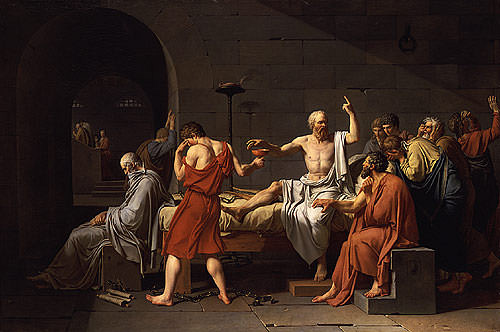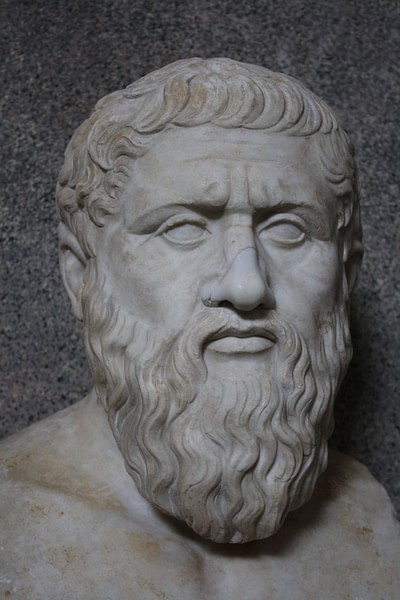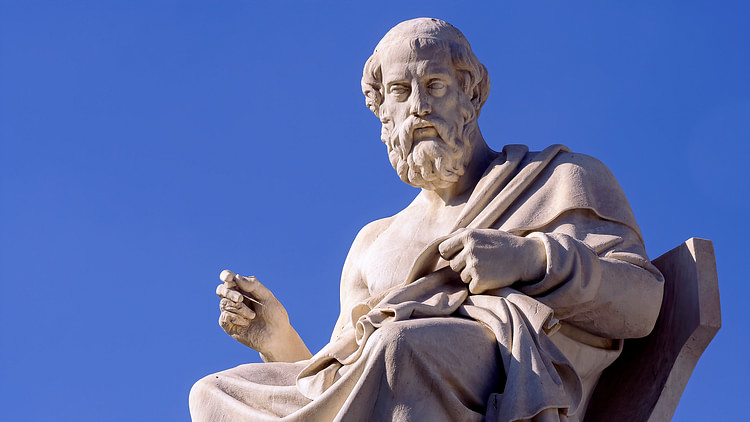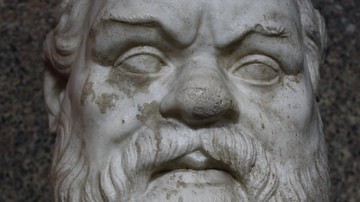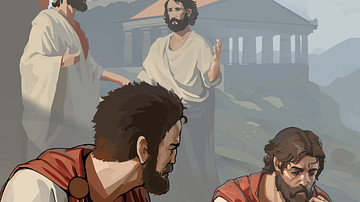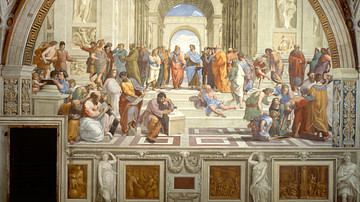The Last Days of Socrates is a modern-day title for the collection of four Socratic dialogues by the Greek philosopher Plato – the Euthyphro, Apology, Crito, and Phaedo – telling the story of the trial, imprisonment, and death of Socrates and presenting Plato's vision of the ideal philosopher and a life lived in pursuit of ultimate truth.
Socrates' execution at Athens in 399 BCE had a profound effect on his student Plato, who was inspired by his teacher to abandon his political and literary ambitions and devote himself to philosophy. Although Socrates is often referred to as the 'Father of Western Philosophy', this title is more correctly applied to Plato. Socrates himself wrote nothing, and almost everything that is known of the older philosopher comes from Plato's Dialogues.
The vision Plato shared with the world was unlike any that came before. Whether that vision actually belonged to Socrates, there is no way of knowing. Contemporaries of Plato, such as the philosopher Phaedo, another of Socrates' students, allegedly claimed that Plato's dialogues misrepresented Socrates entirely and were wholly Plato's thoughts.
Besides his works Republic, Meno, and Symposium, Plato is best known for the four dialogues commonly collected under the title The Last Days of Socrates, which can be read as a four-act play: Act I presenting Socrates engaging in the kind of inquiry which resulted in the charges of his corrupting the youth of Athens and promoting a belief in other gods (the Euthyphro); Act II detailing his defense and conviction by the Athenian court (Apology); Act III presenting his firm belief in his own vision while in prison (Crito); and Act IV his final attempt to clarify his vision of the immortality of the soul and ultimate truth prior to his execution by drinking the cup of hemlock (Phaedo).
In writing this drama, Plato created the paradigm of the visionary who dies for his beliefs that has been held up by generations ever since as an example to be followed in standing one's ground for truth and justice even when facing death for one's convictions. Central to the vision Plato attributes to Socrates is his famous Theory of Forms, which holds that there is an ultimate truth one must strive for. Plato could not empirically prove the existence of the realm of Forms – even his most famous student, Aristotle, rejected the concept of the invisible plane – but that never stopped him from trying.
Plato's Theory of Forms
The Theory of Forms, which Plato maintained and tried to prove in all his works, claims that there is a higher, invisible, realm above the world one sees, and this realm is truer, better, and more beautiful than anything one sees on Earth. In fact, all that one sees in one's life is only a reflection of what exists in the ideal realm of the Forms. When one claims that a vase, or anything else, is beautiful one is recognizing in that object the ideal form of beauty in which that object participates. The ideal form of beauty can be approached by the people, animals, objects – anything – one sees or experiences, and the more direct this participation, the more beautiful that person or object will appear.
This same paradigm holds true for those concepts one claims are "good" or "true" – a claim or belief can only be true in so far as it participates in the ideal of Truth, and only be good as far as it approaches true Goodness. This theory would be applicable to concepts as lofty as God's existence or as commonplace as the appreciation of a meal; one's dinner would not taste good simply because it suited one's individual palate but because the preparation of the food that meal consists of participates more fully in the realm of Forms than other food.
Plato rejected completely the relativist claim, promoted by Protagoras (l. c. 485-415 BCE), that "of all things a man is the measure" best expressed in the phrase that beauty is in the eye of the beholder. The notion that all things are relative to individual perception and experience is antithetical to Plato's vision.
Plato maintained that one cannot simply believe or do as one wishes and maintain that this is the right way to live; one should instead work to discover what the right way to live actually is and then try one's best to live that way. Through his four-act drama, Plato provides a role model in Socrates for others to emulate and this drama relies completely on one's acceptance of the Theory of Forms; a world of ideal, objective, truth which exists independently of one's individual belief system.
The Euthyphro
The dialogue of the Euthyphro opens the play and presents Socrates before he enters the court to defend himself against the capital charge of impiety. His chief accuser was a poet named Meletus, a young man about whom nothing is known outside of his association with Socrates' trial, and two others, Anytus and Lycon, all prominent citizens of Athens. As the dialogue begins, Socrates meets the much younger man, Euthyphro, who is there to prosecute his father on the same charge. Plato fashions Euthyphro's situation as a dramatic mirror to Socrates' own: a younger man who knows little or nothing of what he's alleging bringing a serious charge against an older man.
Throughout the dialogue, it becomes increasingly clear that Euthyphro is a foolish and pretentious child claiming a superior knowledge of the gods and their will which he cannot demonstrate. Socrates' persistence in trying to get Euthyphro to realize he is claiming knowledge he does not have, and to try to face this truth and re-evaluate his life, is intended as an example of how Socrates "corrupted the youth" of Athens. By confronting people with their pretension and false self-images, Socrates encouraged them to question everything they had been taught or thought they knew, and this did not sit well with the authorities in Athens.
This is not to say that "corrupting the youth" was the reason Socrates was executed; there were many more factors operating in Athens to condemn him. Plato knew this, of course, and he uses the Euthyphro to demonstrate how absurd the charge was while also pointedly dramatizing how someone could interpret Socrates' efforts as disruptive and destructive. Euthyphro, after all, is just a very silly young man who, by his own admission in the dialogue, is never taken seriously by anyone. Leaving him alone with his delusions of grandeur would not have affected anyone in Athens to any serious degree, but to Socrates, the improvement of anyone's soul was of paramount importance.
The Apology
The Apology continues the drama as Socrates stands trial before the men of Athens. The title has nothing to do with Socrates accepting responsibility for a wrong done and asking for forgiveness. Apology means a defense of a position, and in the course of this dialogue, Socrates defends his actions and his beliefs in one of the finest speeches in literary history:
Men of Athens, I honor and love you; but I shall obey God rather than you and, while I have life and strength, I shall never cease from the practice and teaching of philosophy, exhorting anyone whom I meet after my manner, and convincing him saying: O my friend, why do you who are a citizen of the great and mighty and wise city of Athens care so much about laying up the greatest amount of money and honor and reputation and so little about wisdom and truth and the greatest improvement of the soul, which you never regard or heed at all? Are you not Ashamed of this? And if the person with whom I am arguing says: Yes, but I do care; I do not depart or let him go at once; I interrogate and examine and cross-examine him, and if I think that he has no virtue, but only says that he has, I reproach him with undervaluing the greater, and overvaluing the less. And this I should say to everyone whom I meet, young and old, citizen and alien, but especially to the citizens, inasmuch as they are my brethren. For this is the command of God, as I would have you know: and I believe that to this day no greater good has ever happened in the state than my service to the God. For I do nothing but go about persuading you all, old and young alike, not to take thought for your persons and your properties, but first and chiefly to care about the greatest improvement of the soul. I tell you that virtue is not given by money, but that from virtue come money and every other good of man, public as well as private. This is my teaching, and if this is the doctrine which corrupts the youth, my influence is ruinous indeed. But if anyone says that this is not my teaching, he is speaking an untruth. Wherefore, O men of Athens, I say to you, do as Anytus bids or not as Anytus bids, and either acquit me or not; but whatever you do, know that I shall never alter my ways, not even if I have to die many times.
(29d-30c)
Although Socrates defends himself ably, he is convicted of impiety and sentenced to death. Still standing firm in his beliefs he defies his accusers and the members of the jury telling them how "an unexamined life is not worth living" and how he has no regrets, knowing that he has done the will of God and pursued truth to the end. The scholar I. F. Stone has praised Plato's Apology as "a masterpiece of world literature, a model of courtroom pleading; and the greatest single piece of Greek prose that has come down to us. It rises to a climax which never fails to touch one deeply" (210) an opinion shared by many others.
The Crito
In the Crito, Socrates' old friend Crito comes to visit him in prison and tries to convince him to escape. It was common practice in ancient Athens for prisoners who had wealthy and connected friends to bribe the guards and slip out of jail to some far-off Greek colony or another country. Socrates refuses, however, claiming that the laws of Athens have formed him and made him who he is and he cannot choose to ignore them now just because they do not suit him.
Plato describes a dialogue between Socrates and the Laws of Athens in which the laws remind him of all the good they have provided him with personally and the people of the city generally. Socrates tells Crito that, if he were to escape, he would betray the laws which have given him all that he has profited from in life. He would also be betraying himself by running from the sentence imposed on him since he would not be taken seriously anywhere else in the world if he backed down from his teachings by showing that he did not think them worth dying for. The dialogue ends with Crito accepting Socrates' arguments and abandoning his plans for rescuing his friend.
The Phaedo
The Phaedo, the most philosophically complex of the dialogues, is the last act of the drama. Socrates' students have gathered at the prison to talk with their master before his execution. Two friends of his, Simmias and Cebes, both Pythagorean philosophers from Thebes, are the chief interlocutors in the dialogue which argues for the immortality of the soul and life after death.
Socrates begins the discussion, stating, "I am confident that the dead have some kind of existence" (63C), and Simmias and Cebes then propose arguments against this claim in order to test the truth of it. In the Apology, Socrates tells the men of the court that "the state of death is one of two things: either the dead man wholly ceases to be and loses all consciousness or, as we are told, it is a change and a migration of the soul to another place" (40c), but later in the dialogue, he firmly claims that the individual survives bodily death, stating one "must face death hopefully, and believe this one truth, that no evil can happen to a good man, either in life or after death" (41d) and concludes by telling them, "now the time has come and we must go away - I to die, and you to live. Which is better is known to God alone" (42a).
The Phaedo develops these ideas more completely as Simmias and Cebes argue against the immortality of the soul and Socrates refutes their arguments. He uses the Theory of Recollection, which is most clearly developed in another dialogue, the Meno, which argues that what we call "learning" is actually an act of remembering experiences from a former life and, as in that dialogue, tries to prove this by showing how people know things which they were never taught. In the Phaedo, Socrates claims:
Now if we received this knowledge before our birth, and were born with it, we knew, both before and at the moment of our birth, not only the equal, and the greater, and the less, [regarding abstract equality] but also everything of the same kind, did we not? Our present reasoning does not refer only to equality. It refers just as much to absolute good, and absolute beauty, and absolute justice, and absolute holiness; in short, I repeat, to everything which we mark with the name of real, in the questions and answers of our dialectic. So we must have received our knowledge of all realities before we were born. (75c-d)
What he is arguing for here is acceptance of the Theory of Forms in that what one "recollects" is available to one because of the existence of another realm of reality in which one took part prior to birth, a realm in which one was aware of objective, final, truths. In Meno, he argues that, if one dies with one's mental faculties intact, one will better remember what one experienced in a past life and that the realm of Forms will be a part of that experience; in Phaedo, he is expanding on that claim.
The arguments are raised and refuted, but Simmias and Cebes still press for hard evidence of the immortality of the soul, and Cebes claims he does not seem to understand Socrates' argument clearly. At this point Socrates launches into his final proof of the immortality of the soul, beginning by saying:
I mean nothing new, only what I have repeated over and over again, both in our conversation today and at other times. I am going to try to explain to you the kind of cause at which I have worked, and I will go back to what we have so often spoken of, and begin with the assumption that there exists an absolute beauty, and an absolute good, and an absolute greatness, and so on. If you grant me this, and agree that they exist, I hope to be able to show you what my cause is, and to discover that the soul is immortal. (100b)
It is at this point that Socrates' argument falters at two points: 1. that he will "begin with the assumption that there exists" this realm of forms, and, 2., saying to his friends, "if you grant me this, and agree that they exist..." In order for the realm of Forms to act as evidence in support of the immortality of the soul one must accept that such a realm exists without evidence. If one does, then one believes; if one does not, then one will always doubt. In the end, there is no hard evidence to prove the immortality of the soul; there is only faith.
Conclusion
Plato worked his whole life to rationally prove, without a doubt, the existence of a higher plane of existence and higher truths which informed the visible world. In the last dialogue he would write, Laws, he was still trying and still not quite succeeding. Plato's works may be read as one life-long refutation of Protagoras' relativity.
Even though he was never able to prove his objective standards to his own – or others' – satisfaction, his attempt created a concept that had never been articulated before in such a highly developed form: that there is a higher good to strive for in life, an objective truth one should seek, and a right way of living one's life according to the standards of that truth.
In his drama of the last days of Socrates' life, Plato provided the world with the ultimate role model of the philosopher who lives his belief in these higher truths and in the unseen realm from which they originate and gives his life for that belief. Even if one does not accept the claims Plato articulated, one cannot help but admire his vision of a greater, better, world which one draws closer to simply by believing it exists.
